Related Research Articles

Viktor Danilovich Saneyev was a Georgian triple jumper who competed internationally for the USSR. He won four Olympic medals – three golds and one silver (1980). Saneyev set the world record on three occasions. He was born in Sukhumi, Georgian SSR, trained in Sukhumi and Tbilisi, and died in Sydney.
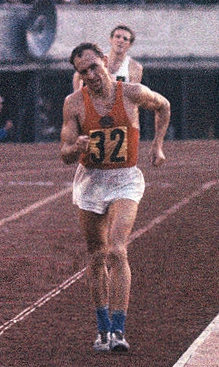
Volodymyr Stepanovych Holubnychy was a Soviet and Ukrainian race walker, who competed for the Soviet Union. He dominated the 20 kilometre race walk in the 1960s and 1970s, winning four Olympic medals from 1960 to 1972 and finishing seventh in 1976. He became Olympic champion in 1960 and 1968. He is regarded as one of the greatest race walkers of all time and competed at the Olympics on five occasions in 1960, 1964, 1968, 1972 and 1976.

Djibouti took part in the 1988 Summer Olympics which were held in Seoul, South Korea from September 17 to October 2. The country's participation marked its second appearance in the Summer Olympics since its debut at the 1984 Summer games in Los Angeles, United States. The delegation from Djibouti included six athletes, five in athletics and one in sailing. The five athletes for athletics were Hoche Yaya Aden, Ismael Hassan, Talal Omar Abdillahi, Hussein Ahmed Salah, and Omar Moussa while Robleh Ali Adou represented the nation in sailing. Ahmed Salah won the nation's first Olympic medal, which is a bronze at the Men's Marathon event.
At the 1968 Summer Olympics in Mexico City, 36 athletics events were contested, 24 for men and 12 for women. There were a total number of 1031 participating athletes from 93 countries.
María Graciela Mendoza Barrios is a retired female race walker from Mexico.

The United States competed at the 1956 Summer Olympics in Melbourne, Australia. 297 competitors, 251 men and 46 women, took part in 139 events in 18 sports.

The United States competed at the 1952 Summer Olympics in Helsinki, Finland. 286 competitors – 245 men and 41 women – took part in 133 events in 18 sports. They won 76 medals, including 6 podium sweeps; the highest number of medal sweeps in a single Olympiad by one country since World War II and still a record.
Nigel Chase Barker was an Australian track and field athlete, who is regarded as holder of Australia's first athletics world record, in the 400 yards, and is an Intercalated Games bronze medalist.
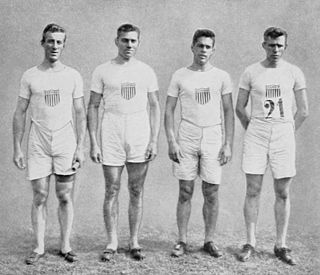
The men's 4 × 400 metres relay was a track and field athletics event held as part of the Athletics at the 1912 Summer Olympics programme. It was the debut of the event, which along with the 4 × 100 metre relay marked the first relays of equal legs in the athletics programme. The competition was held on Sunday, July 14, 1912, and on Monday, July 15, 1912. Twenty-eight runners from seven nations competed. NOCs could enter 1 team of 4 athletes, with up to 2 reserves.
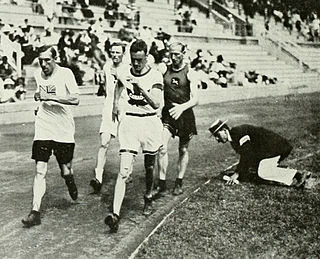
The men's 10 kilometres walk was a track and field athletics event held as part of the Athletics at the 1912 Summer Olympics programme. It was the second appearance of racewalking, which had debuted at the previous games with the 10 mile and 3500 metre walks. The 10 kilometre was the only racewalking event in 1912. The competition was held on Monday, July 8, 1912, and on Thursday, July 11, 1912. Twenty-three racewalkers from twelve nations competed. NOCs could enter up to 12 athletes.
Wheelchair racing at the Summer Olympics featured as demonstration competitions at the multi-sport event, appearing within the Olympic athletics programme from 1984 to 2004. On each occasion two track races were held: a men's 1500 metres race and a women's 800 metres race. This was the first time events for disabled athletes have featured at the Summer Olympic Games, with the Paralympic Games being the traditional venue for top level para-athletics. The wheelchair races were the second Olympic exhibition event for disabled athletes, following on from the disabled skiing at the 1984 Winter Olympics, held earlier that year.
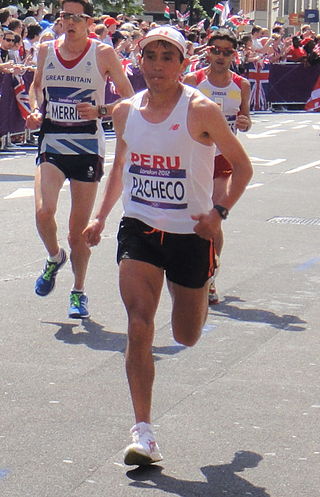
Raúl Manuel Pacheco Mendoza is a Peruvian long-distance runner. He was born in Santa Fe de Jauja. He competed at the 2012 Summer Olympics in the men's marathon, finishing in 21st place. Raul Pacheco placed 6th at the Rotterdam Marathon (2:11:01) in 2015, set a new national record and qualified for the Rio 2016 Summer Olympics. In July 2015, he placed second in the Toronto Pan American Games with a time of 2:17:13, and took home Peru's inaugural medal in a marathon at the Pan American games.

The 100 metres at the Summer Olympics has been contested since the first edition of the multi-sport event. The men's 100 metres has been present on the Olympic athletics programme since 1896. The 100 metres is considered one of the blue ribbon events of the Olympics and is among the highest profile competitions at the games. It is the most prestigious 100 metres race at an elite level and is the shortest sprinting competition at the Olympics – a position it has held at every edition except for a brief period between 1900 and 1904, when a men's 60 metres was contested.

The 400 metres at the Summer Olympics has been contested since the first edition of the multi-sport event. The men's 400 m has been present on the Olympic athletics programme since 1896 but nearly seventy years passed before the introduction of the women's 400 m, which has been held continuously since the 1964 Games. It is the most prestigious 400 m race at elite level. The competition format typically has two qualifying rounds leading to a final race between eight athletes.

The 4 × 400 metres relay at the Summer Olympics is the longest track relay event held at the multi-sport event. The men's relay has been present on the Olympic athletics programme since 1912 and the women's event has been continuously held since the 1972 Olympics. The inaugural and so far the only mixed 4 × 400 metres relay was held at the 2020 Olympics. It is the most prestigious 4×400 m relay race at elite level. At the 1908 Summer Olympics, a precursor to this event was held – the 1600 m medley relay. This event, with two legs of 200 m, one of 400 m, and a final leg of 800 m, was the first track relay in Olympic history.
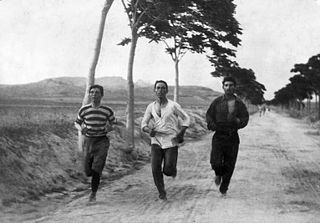
The marathon at the Summer Olympics is the only road running event held at the multi-sport event. The men's marathon has been present on the Olympic athletics programme since 1896. Nearly ninety years later, the women's event was added to the programme at the 1984 Olympics in Los Angeles.

The pole vault at the Summer Olympics is grouped among the four track and field jumping events held at the multi-sport event. The men's pole vault has been present on the Olympic athletics programme since the first Summer Olympics in 1896. The women's event is one of the latest additions to the programme, first being contested at the 2000 Summer Olympics – along with the addition of the hammer throw, this brought the women's field event programme to parity with the men's.

The long jump at the Summer Olympics is grouped among the four track and field jumping events held at the multi-sport event. The men's long jump has been present on the Olympic athletics programme since the first Summer Olympics in 1896. The women's long jump was introduced over fifty years later in 1948 and was the second Olympic jumping event for women after the high jump, which was added in 1928.
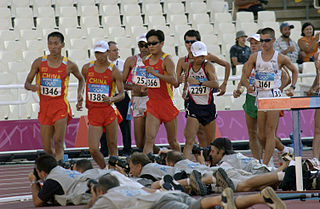
Race walking events at the Summer Olympics have been contested over a variety of distances at the multi-sport event. There were three race walking events in the 2020 Summer Olympics: a men's and a women's 20 kilometres walk, and a men's 50 kilometres walk. The races were held in a final-only format.

Combined events at the Summer Olympics have been contested in several formats at the multi-sport event. There are two combined track and field events in the current Olympic athletics programme: a men's decathlon and a women's heptathlon.
References
- ↑ Evans, Hilary; Gjerde, Arild; Heijmans, Jeroen; Mallon, Bill; et al. "Ed Mendoza Olympic Results". Olympics at Sports-Reference.com. Sports Reference LLC. Archived from the original on April 17, 2020. Retrieved November 15, 2017.
